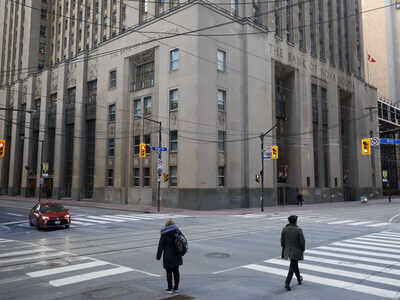
WASHINGTON: The United States and perhaps many nations across the world face the prospect of a “rolling shutdown” lasting months, with accounts of the coronavirus resurfacing whenever countries and communities relax mitigation measures and restrictions. South Korea is also reporting that dozens of recovered coronavirus are testing positive again, making return to normalcy a tough call to make.
Amid reports that there has been an uptick in Covid-19 cases in China after the country eased some restrictions, some experts are suggesting a rolling, on-off strategy, including geographical sectioning, to keep the pandemic in check, till such time full control can be established through proven medical therapy or vaccine.
“We’re looking around the world. As they relax the economic controls, the virus flares back up again. We could have these waves of flareups, controls, flareups and controls until we actually get a therapy or a vaccine. I think we should all be focusing on an 18-month strategy for our health care system and our economy,” Neel Kashkari, the Indian-American Federal Reserve Bank of Minneapolis President who oversaw the 2008 economic recovery, said on CBS’s Face the Nation on Sunday.
Others, including Dr Anthony Fauci, have expressed similar outlook, suggesting a gradual and partial re-opening of the economy starting May 1, and reeling things back if the virus resurfaces, as it appears to do so whenever mitigation measures are relaxed. Most experts appear to discount the possibility of a V-shaped recovery that President Trump desires, with his hopes that the economy will take off "like a rocket" once restrictions are lifted.
What is increasingly mystifying for researchers is that the virus is practically benign in some people, while being brutal in others, independent of pre-conditions, and even beyond gender specificities (some studies show men are more vulnerable to it than women, and mortality rates are higher among men than women).
On Monday, ABC Good Morning America anchor George Stephanopoulos announced that he had tested positive for Covid-19 but felt no symptoms, two weeks after his wife said she was going through "High fever. Horrific body aches. Heavy chest," has "never been sicker. Stephanopoulos on the other hand said "I've never had a fever, never had chills, never had a headache, never had a cough, never had shortness of breath. I'm feeling great."
The difficulty in assessing the lethality of the virus is compounded by the relatively modest death toll from the pandemic, compared to other infectious diseases such as tuberculosis that take even more lives annually. Arguments abound as to whether the lower-than-estimated/feared count is because of mitigation measures or because of exaggeration and hysteria about the pandemic.
In fact, some are arguing it should not even be called a pandemic as it emerges the annual death toll is less than the regular flu. "Now, we all regret the loss of 61,000 people, if that's what it turns out to be… But if you look at those numbers, and see the comparable, we're going to have fewer fatalities from this than from the flu. For this, we scared the hell out of the American people, we lost 17 million jobs, we put a major dent in the economy, we closed down the schools shut down the churches, and so on. You know, this was not, and is not a pandemic," said former education secretary Bill Bennett, arguing that the hype had caused more damage than the virus.
Amid reports that there has been an uptick in Covid-19 cases in China after the country eased some restrictions, some experts are suggesting a rolling, on-off strategy, including geographical sectioning, to keep the pandemic in check, till such time full control can be established through proven medical therapy or vaccine.
“We’re looking around the world. As they relax the economic controls, the virus flares back up again. We could have these waves of flareups, controls, flareups and controls until we actually get a therapy or a vaccine. I think we should all be focusing on an 18-month strategy for our health care system and our economy,” Neel Kashkari, the Indian-American Federal Reserve Bank of Minneapolis President who oversaw the 2008 economic recovery, said on CBS’s Face the Nation on Sunday.
Others, including Dr Anthony Fauci, have expressed similar outlook, suggesting a gradual and partial re-opening of the economy starting May 1, and reeling things back if the virus resurfaces, as it appears to do so whenever mitigation measures are relaxed. Most experts appear to discount the possibility of a V-shaped recovery that President Trump desires, with his hopes that the economy will take off "like a rocket" once restrictions are lifted.
What is increasingly mystifying for researchers is that the virus is practically benign in some people, while being brutal in others, independent of pre-conditions, and even beyond gender specificities (some studies show men are more vulnerable to it than women, and mortality rates are higher among men than women).
On Monday, ABC Good Morning America anchor George Stephanopoulos announced that he had tested positive for Covid-19 but felt no symptoms, two weeks after his wife said she was going through "High fever. Horrific body aches. Heavy chest," has "never been sicker. Stephanopoulos on the other hand said "I've never had a fever, never had chills, never had a headache, never had a cough, never had shortness of breath. I'm feeling great."
The difficulty in assessing the lethality of the virus is compounded by the relatively modest death toll from the pandemic, compared to other infectious diseases such as tuberculosis that take even more lives annually. Arguments abound as to whether the lower-than-estimated/feared count is because of mitigation measures or because of exaggeration and hysteria about the pandemic.
In fact, some are arguing it should not even be called a pandemic as it emerges the annual death toll is less than the regular flu. "Now, we all regret the loss of 61,000 people, if that's what it turns out to be… But if you look at those numbers, and see the comparable, we're going to have fewer fatalities from this than from the flu. For this, we scared the hell out of the American people, we lost 17 million jobs, we put a major dent in the economy, we closed down the schools shut down the churches, and so on. You know, this was not, and is not a pandemic," said former education secretary Bill Bennett, arguing that the hype had caused more damage than the virus.
Download
The Times of India News App for Latest World News
Subscribe
Start Your Daily Mornings with Times of India Newspaper! Order Now

Coronavirus outbreak
Trending Topics
LATEST VIDEOS
More from TOI
Navbharat Times
Featured Today in Travel
Get the app









